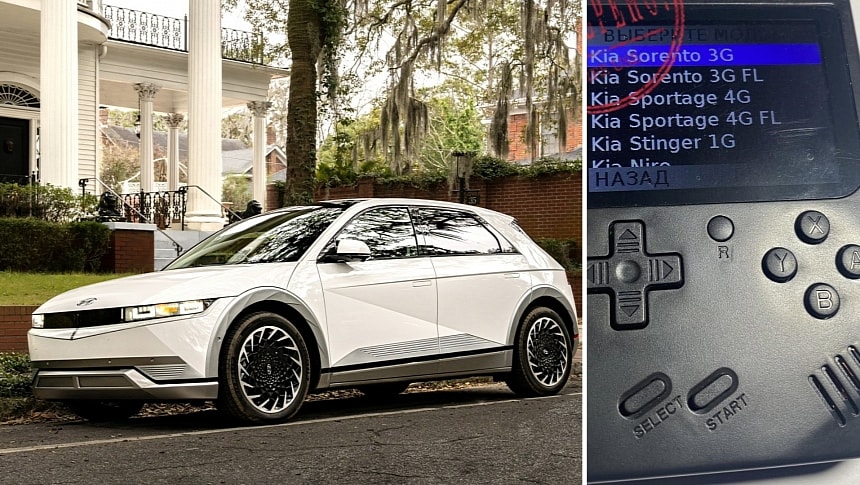Hyundai and Kia are again in the spotlight for car theft, as thieves have learned how to get access to the latest EV models from the Korean carmakers. This makes the relatively expensive "Game Boy" car key emulators a worthy investment for criminals across the globe.
Hyundai and Kia have caught a lot of unwanted attention in the past years, as the so-called "Kia Boyz" started stealing their cars for fun. The Korean brands saw their vehicles soaring to the top of the most stolen vehicle rankings. To be fair, Hyundai and Kia earned this honor by saving a few bucks and producing vehicles without electronic immobilizers. This made them so easy to steal that kids did it as a challenge, hence the name of Kia Boyz.
While Hyundai and Kia made a strategic error that put their customers at risk, no car brand is safe from theft. No matter how complicated a security system is, car thieves will find ways around it if the prize is worth it and the chances of being caught are small. The "worth it" part means that a car must either be very easy to steal or expensive to attract attention. So far, Hyundai and Kia vehicles have been in the former category, but a new development might change everything.
Another method has become popular in recent years, even though it requires expensive equipment. It's called the "Game Boy" method because the thieves use a device resembling a Nintendo Game Boy console. This is basically a car key emulator, tricking a vehicle into thinking the device is the original key. Key emulators are not cheap, with prices in the tens of thousands of dollars. However, they are simple to operate, allowing criminals to drive off with a stolen car in seconds.
Although Game Boy devices have been used in the past, the high price meant that only highly skilled professionals could afford them. Key emulator theft has not been widespread because they are usually used to steal expensive vehicles. However, as electric cars have become more popular, thieves using key emulators are now targeting volume brands.
The list includes all electric models from Hyundai, Kia, and Genesis, alongside combustion and hybrid models. Many Ioniq 5 owners have reported that their EVs have been stolen using a key emulator in the past months. The problem worsened after popular key emulators got a new update, offering support for emulating keys of new car models. For some reason, vehicles from Asian carmakers, with Hyundai, Kia, and Genesis the most popular, have been among those supported. Nissan and Mitsubishi models are also supported.
The key emulator starts communicating with the target vehicle once this is woken up by touching the door handle. The emulator software only needs a few seconds to find the right code. Some newer models might require a unique PIN to be generated based on the vehicle's VIN. However, since this is visible from outside the car, it's just one more step added to the theft procedure, not a real deterrent.
Unlike the relay attack, which requires the transponder to be in close proximity to the original key fob, the Game Boy method works even without a key. In fact, some owners report their vehicles have been stolen using this method while traveling abroad. Although Hyundai/Kia vehicles offer GPS tracking in their respective apps (Hyundai Bluelink/Kia Connect), thieves simply remove the stolen vehicles from their owners' accounts, preventing further access.
While Hyundai and Kia made a strategic error that put their customers at risk, no car brand is safe from theft. No matter how complicated a security system is, car thieves will find ways around it if the prize is worth it and the chances of being caught are small. The "worth it" part means that a car must either be very easy to steal or expensive to attract attention. So far, Hyundai and Kia vehicles have been in the former category, but a new development might change everything.
Another method has become popular in recent years, even though it requires expensive equipment. It's called the "Game Boy" method because the thieves use a device resembling a Nintendo Game Boy console. This is basically a car key emulator, tricking a vehicle into thinking the device is the original key. Key emulators are not cheap, with prices in the tens of thousands of dollars. However, they are simple to operate, allowing criminals to drive off with a stolen car in seconds.
Although Game Boy devices have been used in the past, the high price meant that only highly skilled professionals could afford them. Key emulator theft has not been widespread because they are usually used to steal expensive vehicles. However, as electric cars have become more popular, thieves using key emulators are now targeting volume brands.
The list includes all electric models from Hyundai, Kia, and Genesis, alongside combustion and hybrid models. Many Ioniq 5 owners have reported that their EVs have been stolen using a key emulator in the past months. The problem worsened after popular key emulators got a new update, offering support for emulating keys of new car models. For some reason, vehicles from Asian carmakers, with Hyundai, Kia, and Genesis the most popular, have been among those supported. Nissan and Mitsubishi models are also supported.
The key emulator starts communicating with the target vehicle once this is woken up by touching the door handle. The emulator software only needs a few seconds to find the right code. Some newer models might require a unique PIN to be generated based on the vehicle's VIN. However, since this is visible from outside the car, it's just one more step added to the theft procedure, not a real deterrent.
Unlike the relay attack, which requires the transponder to be in close proximity to the original key fob, the Game Boy method works even without a key. In fact, some owners report their vehicles have been stolen using this method while traveling abroad. Although Hyundai/Kia vehicles offer GPS tracking in their respective apps (Hyundai Bluelink/Kia Connect), thieves simply remove the stolen vehicles from their owners' accounts, preventing further access.







